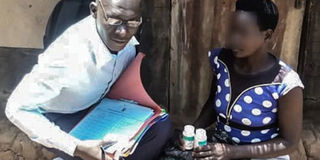Good Samaritan treks 7kms to deliver ARVs to patients

Mr Oscar Ewaa, a volunteer for HIV/Aids awareness programmes, delivers medicine to one of the patients in Kwania District on Wednesday. PHOTO BY BILL OKETCH
Mr Oscar Ewaa, who was born with HIV/Aids, started taking his anti-retroviral (ARV) pills at the age of seven.
Now 25 and a volunteer for HIV/Aids awareness programmes, Mr Ewaa knows when persons living with HIV/Aids are started on ARVs and follows them up to their homes to ensure they take their medication every day without fail.
However, when public transport was stopped by President Museveni in the fight against Covid-19, Mr Ewaa realised that dozens of HIV/Aids patients in Kwania District had defaulted on taking their medication. Today, food shortages brought about by the country’s lockdown is a key barrier to ARVs treatment, among people living with HIV/Aids in Kwania, Kole, Apac and Lira districts.
But the risk of repeated illness due to opportunistic infections and the developments of drug-resistant forms of HIV/Aids infection increase if patients don’t adhere to set directives, according to World Health Organisation (WHO).
Because of this, Mr Ewaa, a resident of Apwori Village, Acenlworo Parish in Chawente Sub-county, Kwania District, started trekking more than seven kilometres to deliver drugs to HIV/Aids patients.
Mr Ewaa says he started picking up the drugs from health units and delivering to households after realising that many people were not taking their medication.
“When I check the register and see that this one has missed an appointment and is supposed to pick up ARVs today, I collect the drugs myself and deliver to that patient,” he says.
Mr Ewaa was later given a bicycle by an organisation to help him reach out to many patients. He has been doing this since the lockdown started on April 1.
So far, the chairperson of young people living with HIV/Aids in northern Uganda, has delivered ARVs to 427 households. Mr Ewaa has also delivered TB drugs to 13 households, all in Kwania District.
“Due to the lockdown, HIV/Aids patients are facing difficulties in accessing ARVs and other specialised services,” he says.
But the bicycle, which was to support his movement, has since broken down.
“It is hard riding a bicycle. As I talk now, the bicycle is spoilt and I don’t have any single coin for repairing it,” he says while appealing to well-wishers to buy for him a motorbike to support his work.
“I move to Lira, Apac, Kwania and Kole delivering ARVs, TB drugs and condoms to vulnerable population,” he adds.
On Thursday, Mr Ewaa had to trek to deliver ARVs to patients within Aduku Town Council. But some HIV -positive patients have already defaulted on taking medication because of the biting hunger.
On medication
Mr Ewaa says 80 out of 1,000 young people who enrolled on medication at Aduku Health Centre IV, Apwori, Chawente, Inomo, Abongomola and Nambieso health centre IIIs have since defaulted on anti-retroviral treatment.
Among them is a 22-year-old girl who lost her job at a bar due to the Covid-19 pandemic.
“Because of the lockdown, the bar was shutdown and we were all sent home. Now I can no longer take my medication because of hunger. These drugs need food. If you take without eating, it weakens your body,” the 22-year-old girl says.
Another 15-year-old girl who is heading a family of five is said to have stopped taking her HIV treatment.
Two orphaned children aged 12 and eight from Nambieso Sub-county have also shunned medication because of lack of food. The children were staying with their grandmother, who passed on last Friday.
Before the lockdown, Mr Hamza Okello Ogole, the youth leader of Atek Okwer Ibu clan, and Mr Ewaa contributed money and purchased for them food.
The wide and rapid spread of coronavirus and the subsequent lockdown got majority of Ugandans, especially vulnerable population offguard.
The locals were still hoping for the usual trend of events to prevail. Little did they know the lockdown meant no public gatherings, social distancing, and no movement of public vehicles, among others!
It now remains clear that the challenge faced by HIV/Aids patients in accessing treatment must be addressed by government, otherwise lives are at risk.




